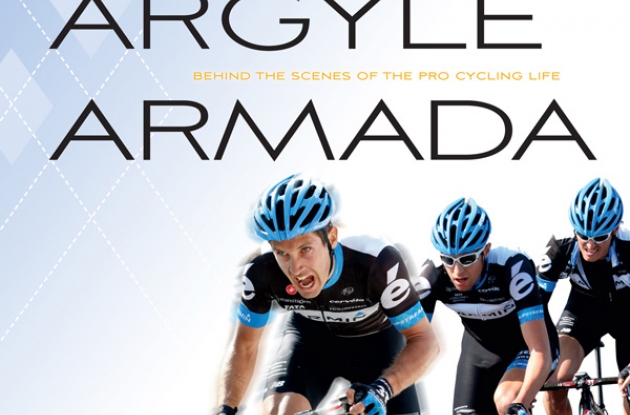Argyle Armada: Behind the Scenes of the Pro Cycling Life -- A Review
Mark Johnson's Argyle Armada: Behind the Scenes of the Pro Cycling Life is the story of the Garmin-Cervelo team's 2011 season.
Mark Johnson's Argyle Armada: Behind the Scenes of the Pro Cycling Life is the story of the Garmin-Cervelo team's 2011 season. The American squad, which began life as a developmental team in 2003, has grown into the little engine that could, a low-budget team that can race with the best. The 2011 season was the team's finest. During that campaign, Garmin-Cervelo won Paris-Roubaix. In addition, it picked up four stage wins in the Tour de France and won that race's team competition, as well as having a team member (Thor Hushovd) wear yellow for seven days.
Four themes run through Argyle Armada. The first is that of the inner workings of a cycling team throughout the season. The book begins at the team's base in Girona, Spain, with riders going on training rides, being fitted for equipment, and meeting sponsors. From there, the book goes through the season--the spring classics, the Grand Tours, the Tour of California, the USA Pro Cycling Challenge, the Grand Prix de Quebec, and the Grand Prix Cycliste de Montreal. A cycling team exists to compete, and the book covers the season, accentuating the positive without glossing over the negative. The season ends in Boulder, Colorado, in October 2011, with directeur sportif Jonathan Vaughters giving a presentation about the team in 2012, with a emphasis on the business side of cycling.
Beyond this, the book covers larger issues in cycling. A major issue is clean sport. Members of the team's staff discuss how samples of nutritional supplements are sent to a lab to be tested to ensure that they do not contain performance enhancing substances. Moreover, the team relies on scientific research to provide substantiation for what some view as unorthodox stances. For example, Garmin does not use intravenous methods to help athletes' recovery, even though that is legal, because research has established that athletes do not recover faster intravenously. The taking of needles out of the equation gives the team credibility in the fight against doping.
The creation of a sounder business model that currently exists for cycling is another theme that the book stresses. Directeur sportif Jonathan Vaughters and others discuss how cyclists might unite to obtain better pay and working conditions for themselves. In addition, he points out that when a rider with many ProTour points leaves a team, his points leave with him; Vaughters adds that such departures can make teams ineligible for the most lucrative races and that some compromise needs to be devised. He states that cycling is a traditional sport that must incorporate modernity, as baseball has.
One theme that is not written but that comes through is that Garmin, like American teams going back to 7-11 in the 1980s, is quirky and iconoclastic. American teams do it their way, and that translates into racing performance. The 2011 Paris-Roubaix, in which Johan Vansummeren was supposed to be working for Thor Hushovd but found himself in the lead group with 23 miles remaining, is an example. Hushovd took Fabian Cancellara's (Leopard-Trek) wheel as Cancellara chased. Vansummeren did what he was expected to do--think for himself--attacked, and won the biggest victory of his and Garmin's life to that point. Vaughters says the following of the type of rider whom he seeks: "I like guys that are intelligent and willing to learn. What I'm looking for are smart guys that may be a little bit weird, because a lot of time intelligence goes hand-in-hand with goofiness, especially in bike riders."
Johnson has a pleasing writing style, and the illustrations are first-rate. Argyle Armada is an excellent example of the workings of a professional cycling team. Moreover, it does a fine job of looking at contemporary cycling and of cycling as a business. Read this book to get a handle on how cycling and cycling teams work.
Follow Roadcycling.com on Twitter and Facebook to receive daily road cycling news updates automatically.








